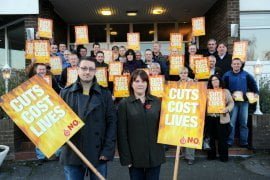Clerkenwell Fire Station was the oldest in Europe until 9.30 yesterday (Thursday 9th January) morning, when it was closed along with nine other stations around London as part of austerity measures imposed on the Emergency Services by the Mayor of London, Boris Johnson. Guy Howie of the UCLU Marxists reports on the cutbacks to the fire brigade in London, which have also resulted in the redundancy of 552 firefighters and the removal of 14 fire engines from service.
Clerkenwell Fire Station was the oldest in Europe until 9.30 yesterday (Thursday 9th January) morning, when it was closed along with nine other stations around London as part of austerity measures imposed on the Emergency Services by the Mayor of London, Boris Johnson. The cutbacks also resulted in the redundancy of 552 firefighters and the removal of 14 fire engines from service.
Protests against these measures coincide with a period of national strike action by the Fire Brigade Union (FBU) over the loss of a pension scheme for firefighters and the extension of the working age to 60.
The cuts to the fire brigade service exemplify the savage attacks on working people by the government, who have long since neglected to value the human lives they now put in immediate danger with these closures in London. But during the largest economic crisis the world has ever seen, capitalism necessitates this neglect of human life.
Boris Johnson knows that this is not what people want, certainly not what the growing population of London needs, which is why the austerity measures fall under the title “Fifth London Safety Plan” and Johnson assures us that use of the fire brigade is in decline.
In reality the Mayor, along with the national government, must continue to serve the interests of capitalists, who already have their eye on the station in Clerkenwell as a potential venture into the luxury housing market. What is required is to break with the system founded on a profit motive that compels the Mayor of London to sell off much needed emergency services to developers of luxury housing. This break must come on the basis of the organisation of the working class.
The turnout to the protest outside Clerkenwell Fire Station was significant. The historical significance of Clerkenwell (also one of the stations deployed after the 7/7 bombings) may have had something to with this good turnout; but 120 people, including representatives and members of the CWU, UCU and UNISON, early in the morning on a workday was commendable.
Many off duty firefighters from stations not closing also came out to support their colleagues. Bizarrely, to the scorn of many, the local Lib Dems also came out in force. Supporters of the party complicit in government austerity, including attacks on firefighters nationwide, behaved with shameless hypocrisy by engaging in the protests sporting Liberal Democrat placards and looking for any available photo opportunity.
There was a short rally at the end of the protest in which Islington Labour MP Emily Thornberry and Regional Secretary of the FBU Paul Embery, among others, spoke of the “disgrace” of the closure and the need to organise a fightback. To add insult to injury, it was announced during the rally that firefighters finishing the final shift had been threatened with disciplinary action if they walked out to the protest in their uniform. Such a threat only betrays the fear of the bosses, as they sense the growing echo those at the forefront of workers struggles are finding in the working class as a whole, exemplified by the broad union solidarity present at the Clerkenwell protest.






